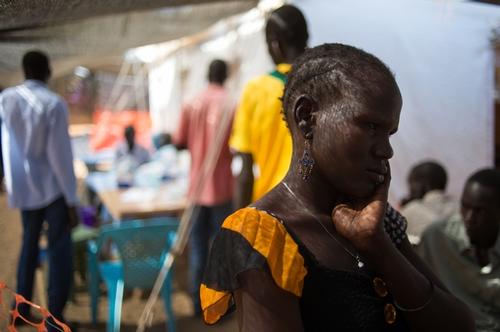23 July 2015 - As fighting intensifies in South Sudan’s Upper Nile state, and people’s humanitarian needs grow, aid organisations are finding it increasingly difficult to access the most severely affected areas. Médecins Sans Frontières (MSF) calls on all parties to the conflict to allow unrestricted access to Malakal and surrounding areas, so that aid agencies can provide urgent humanitarian assistance to thousands of people caught up in the violence.
“Tens of thousands of people have been without access to medical care for three months,” says William Robertson, MSF’s program manager for South Sudan. “This is happening amidst a new wave of violence threatening the lives of countless civilians.”
Malakal town, which has changed hands multiple times in the past 18 months, has emptied as a result of continued fighting. In the past six weeks, MSF has been able to make only a single delivery of medical and food supplies to its health centre in Wau Shilluk, on the outskirts of Malakal. There are 77 children with severe acute malnutrition in MSF’s outpatient therapeutic feeding programme, but there is currently no way to resupply them with essential ready-to-use therapeutic food.
With Malakal town on high security alert, and a heavy military presence, many people have fled to the nearby ‘protection of civilians’ site. However, the site is not a place of safety; MSF treated nine people wounded in a shooting attack which directly targeted the site in early July.
On July 19 and 20, MSF’s hospital in Malakal received 36 wounded civilians, including 16 women and five children, who had been travelling in a truck when they were attacked by an armed group. Some had multiple blast injuries caused by grenades and others had bullet wounds. Five needed emergency surgery. This is just one example of countless episodes of violence against civilians in Upper Nile state.
Other people have fled Malakal for the town of Melut, to the north. MSF has been forced to suspend its medical activities in Melut town twice in the past six weeks, leaving the 20,000 displaced people living in Denthoma one (1) camp without medical care.
Yet others have fled Malakal for the far bank of the White Nile, where there is a lack of basic amenities such as food, clean water and medicine.
“The continuing violence in South Sudan is forcing ordinary people to live in inhumane conditions,” says Robertson. “People are being exposed to continual violence, increased displacement, fear of attacks, disease outbreaks and the risk of starvation. MSF is deeply concerned about the continued denial of access for aid organisations to conflict areas and other remote areas of South Sudan, which is leaving people without the humanitarian assistance they urgently need. Our sole agenda is to provide assistance to those in need, regardless of their political affiliation, race, ethnicity or the area they are living in.”






